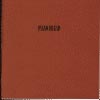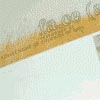 Here are past and present Crouton recordings centered around prolific, poly-pseudonymic, multi-faceted artists Chris Rosenau and Jon Mueller. Piano Bread is a (still available) numbered and cardboard boxed edition of 500 from 1999. It comes with a book with a surreal tale by drummer Mueller that seems to portray an individual's lustful, "piano bread"-addled search for self. Equally mystifying is the disc's 15 untitled tracks which may or may not correspond in some way to the book's 12 chapters. Ranging from one to nearly nine minutes, the pieces are performed by soloists, duets, trios or quartets that include four other players from the Milwaukee area. Musically it's very varied, running the gamut from a lone feminine voice, woodwind or treated harmonica to drums/samples/turntables/double bass band freakouts. To take the easy way out would be to describe much of what's going on here with words such as "avant", "improv" and "freeform" paired with another word that rhymes with "spazz". It's not really my cup of tea, but it would leave out the many other moments of greater interest to me, such as tracks five and 12. Here, Rosenau performs a magic trick with erratic acoustic guitar and banjo plucks and scrapes, sparse keyboard and bass notes, and clarinet chirps, wheezes and drones. On track six, John McCoy's "advanced sound manipulations" make for a murky melting pot of environments and atmospheres while on track seven, Jason Wietlispach drowns Rebecca Gray's ghostly wailing in heavily effected guitar swells. 'Piano Bread' is a bewildering 48 page and 68 minute journey with some intriguing sight seeing along the way.
Here are past and present Crouton recordings centered around prolific, poly-pseudonymic, multi-faceted artists Chris Rosenau and Jon Mueller. Piano Bread is a (still available) numbered and cardboard boxed edition of 500 from 1999. It comes with a book with a surreal tale by drummer Mueller that seems to portray an individual's lustful, "piano bread"-addled search for self. Equally mystifying is the disc's 15 untitled tracks which may or may not correspond in some way to the book's 12 chapters. Ranging from one to nearly nine minutes, the pieces are performed by soloists, duets, trios or quartets that include four other players from the Milwaukee area. Musically it's very varied, running the gamut from a lone feminine voice, woodwind or treated harmonica to drums/samples/turntables/double bass band freakouts. To take the easy way out would be to describe much of what's going on here with words such as "avant", "improv" and "freeform" paired with another word that rhymes with "spazz". It's not really my cup of tea, but it would leave out the many other moments of greater interest to me, such as tracks five and 12. Here, Rosenau performs a magic trick with erratic acoustic guitar and banjo plucks and scrapes, sparse keyboard and bass notes, and clarinet chirps, wheezes and drones. On track six, John McCoy's "advanced sound manipulations" make for a murky melting pot of environments and atmospheres while on track seven, Jason Wietlispach drowns Rebecca Gray's ghostly wailing in heavily effected guitar swells. 'Piano Bread' is a bewildering 48 page and 68 minute journey with some intriguing sight seeing along the way.
samples:
 Fast forward to 2002. Collections of Colonies of Bees is mostly the duo's doing and 'fa.ce (a' is their third album since '99. It is a continuous suite of eight (all but the last untitled) tracks that glide through played, processed and played to be processed sounds - often with elements from each track carrying over into the next.
Fast forward to 2002. Collections of Colonies of Bees is mostly the duo's doing and 'fa.ce (a' is their third album since '99. It is a continuous suite of eight (all but the last untitled) tracks that glide through played, processed and played to be processed sounds - often with elements from each track carrying over into the next.
Besides acoustic and electric guitars, lap steel, piano and steel drums, Rosenau is also credited throughout with "assembly," "manipulation," "miscellaneous noises," and/or the Akai Headrush. Mueller provides drums or percussion on five tracks and another Milwaukee musician, Don Mahlmeister, also adds guitars, Rhodes and Wurlitzer piano, keyboard and programming. That should give you an inkling of the palette and production. In a way, the first track sets a false tone with an upbeat, yet mild-mannered, almost folksy jam involving acoustic guitars, EBow, Rhodes, lap steel, bass and drums. The aftermath is track two, as the final notes slowly fade away and scraped metal and ambient drift supersede. Track three is undoubtedly one of the most beautiful pieces of music I've heard in years, if not ever. At the heart of it all is the guitars, their intermittent suggestions of melody and harmonics intertwined with near silence and tiny electronic currents. It's as delicate and pretty as a music box or Faberge egg. A barely audible background of steel drums and bird song begins track four as computer voiced "dooooo"s of varying length and gender pile up with portamento-wavered piano notes. For song five, melted down lap steel licks pick up where four left off and are coupled with somewhat bombastic drum fills. The 11-minute finale belies its curious title of "mu:rder" as the band invents a gorgeous, deep lull, which, up until the final few minutes, are cluttered with digital debris. Start to finish, 'fa.ce (a' is a very finely-calibrated work. It has an impeccable focus and flow, a well balanced mix between acoustic and electronic instrumentation, and a learned sense of time and space. Plain and simple, 'fa.ce (a' is poetry in motion. Look for it in my top ten of 2002 list.
samples:
Read More

